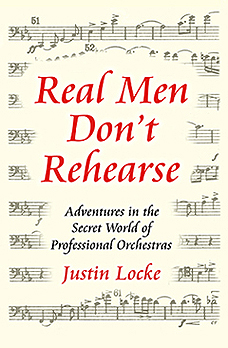I have several friends who work in “Corporate America,” and every once in while one of them will make reference to something called a “performance review.” Now pardon my ignorance here, but apparently, once a year these people sit down with their immediate supervisor and their supervisor gives them an overall review of the quality of their work.
They talk about this kind of thing as though it is perfectly normal. But I have to tell you, for me, coming from orchestral playing, this sounds absolutely nuts.
The first issue is one of simple physical safety. If you were to sit down with a player in a major symphony orchestra and start to tell them what you liked and didn’t like about their playing, well, all I can say is, I hope you have a paramedic and at least two armed guards in attendance. This is awfully personal stuff, people are very sensitive about their performance ability, and, well, . . . you just don’t do that.
My next objection to the concept of an annual performance review is this: why wait? If someone is screwing up or needs to improve, why would you wait 11 months, three weeks and four days to tell them? Of course, I suppose that part of the difference here is that professional musicians are constantly in a state of “performance review.” After all, everyone on the stage and everyone in the audience can hear every single note you’re playing.
My next comment is “who are we kidding??” I can’t speak for corporate culture, but I’ve had a fair amount of experience with human beings, and in most workplaces, everybody knows what everybody else is doing and how good they are what they do. Let’s face it, we all know that Susie got a promotion because she slept with her boss. We all know that Bobby is a screw-up but he sued the last person who fired him, so it’s easier to just keep him on. We all know that Freddie is better than everyone else in his department, but we can’t promoted because he has the lowest amount of seniority.
The other thing I don’t get is, if someone is doing a good job, shouldn’t one tell them . . . right now?
One of my bass teachers used to tell me a story of some major soloists like Isaac Stern, William Primrose, and Pablo Casals getting together to play string quartets. People who are top performers bring an enormous amount of passion to their work, and apparently, in the rehearsals these people fought like cats and dogs over every little thing. I just can’t imagine the concept of giving a “performance review” to people like that, who are that passionate about their work.
I must admit to being somewhat ambivalent about this idea when it comes to my work as a speaker and author. When I give a talk or publish a book, you can rest assured that I am giving it every ounce of energy and capability that I have to give. If you didn’t see it, it means I don’t have it, and quite frankly, the implication that I could do a better job than 100% effort bugs me a little bit. I tape myself and study every little thing, the same way I once hyper-criticized my bass playing. I realize there are times when things could probably be shaded this way and that, and it’s always good to get honest customer feedback. But the huge danger of creating this environment, of a potential authoritarian judgmental putdown down the road, is that it creates a sense of hesitancy and pandering to the system rather than simply acting upon one’s passion full throttle. That, I think, is my biggest objection: how the idea of a day of judgment can negatively impact one’s passion for one’s work right here right now.
I admit, I am subtly using principles of applied stupidity here. I’m displaying my blatant ignorance because I would truly like to know why people do this sort of thing. Other than it being a legally required formality of some sort, in terms of improving actual performance and/or enhancing overall productivity, it makes absolutely no sense to me whatsoever.
© Justin Locke

